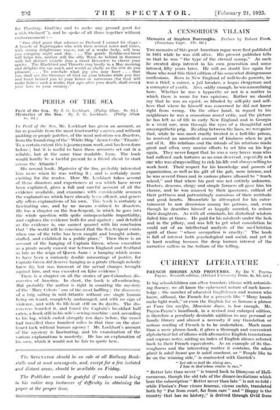A CENSORIOUS VILLAIN
Memoirs of Stephen Burroughs. Preface by Robert Frost. (Jonathan Cape. 12s. 6d.)
THE memoirs of this great American rogue were first published in 1811 while he was still alive. His present publisher tells us that he was " the type of the eternal scamp." As such he created deep interest in his own generation and some interest fifty years later. He will .no doubt live again for those who read this third edition of his somewhat disingenuous confessions. Born in New England of well-to-do parents, he was a thief, a coiner, a jail breaker, a bogus clergyman and a corrupter of youth. Also, oddly enough, he wasa moralizing bore. Whether he was a hypocrite or not is a matter in which there is room for two opinions. Rather we should say that lie was an egoist, so blinded by self-pity and self- love that where he himself was concerned he did not know right from wrong. On the other hand, in regard to his neighbours he was a censorious moral critic, and the picture he has left us of life in early New England and in Georgia is a vivid one, seen through the eyes of a thoughtful and unsympathetic prig. Reading between the lines, we recognize that, while he was most cruelly treated in a hell-like prison, he received an unmerited amount of kindness when he got out of it. His relations and the friends of his relations made great and often very unwise efforts to set him on his legs again. They never forgot that he was a very brave man who had suffered such tortures as no man deserved, especially nct one who was always willing to risk his life and always willingto work hard. Their respect for his knowledge and powers of organization, as well as his gift of the gab, were intense, and he was several times and in various places allowed to " teach school," and that where his past was not entirely unknown. Doctors, deacons, clergy and simple farmers all gave him his chance, and he was amused by their ignorance, critical of their pettiness and patronizingly conscious of their rectitude and good hearts. Meanwhile he attempted for his enter- tainment to sow dissension among his patrons, and, even though he describes himself as happily married, to seduce their daughters. As with all criminals, his diabolical wisdom failed him at times. He paid for his misdeeds under the lash and in the pillory, and was left to get what consolation he could out of an intellectual analysis of the un-Christian spirit of those " whose occupation is cruelty." The book is full of interest both psychological and social, and yet it is hard reading - because the deep human interest of the narrative suffers in the tedium of the telling.










































 Previous page
Previous page